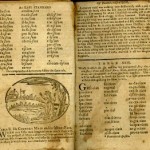In 1824 Noah Webster published a school-book teaching kids English. It was called the “Blue Back Speller.” The book concludes with lessons on virtues and vices. For instance, “avarice” is considered an un-American vice. Here’s what kids were taught about avarice:
Avarice
Q. What is avarice?
A. An excessive desire of possessing wealth.
Q. Is this commendable?
A. It is not; but one of the meanest vices.
Q. Can an avaricious man be an honest man?
A. It is hardly possible; for the lust of gain is almost always accompanied with a disposition to take mean and undue advantages of others.
Q. What effect has avarice upon the heart?
A. It contracts the heart – narrows the sphere of benevolence – blunts all the fine feelings of sensibility, and sours the mind towards society. An avaricious man, a miser…is wrapped up in selfishness, like some worms, which crawl about and eat for some time to fill themselves…
Q. What injury is done by avarice to society?
A. Avarice gathers together more property than the owner wants, and keeps it hoarded up, where it does no good. The poor are thus deprived of some business, some means of support; the property gains nothing to the community; and somebody is less happy by means of this hoarding of wealth.
Q. In what proportion does avarice do hurt?
A. In an exact proportion to its power of doing good. The miser’s heart grows less, in proportion as his estate grows larger. The more money he has, the more he has people in his power, and the more he grinds the face of the poor. The larger the tree and the more spreading the branches, the more small plants are shaded and robbed of their nourishment.

